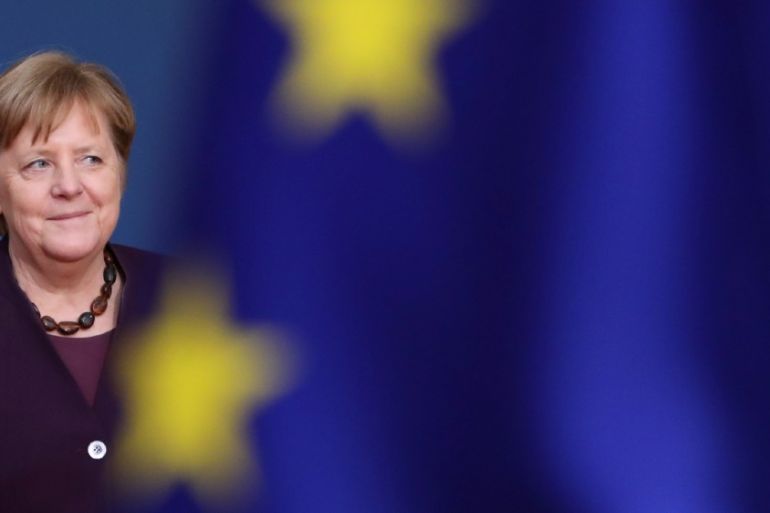German conservatives brood over Merkel’s successor
‘Out of control’ CDU searching for stability in the wake of far-right gains.

Germany’s conservatives are expected to unveil their new leadership on Monday, as Angela Merkel’s party puzzles over how to prepare for the veteran chancellor’s departure next year.
Ratcheting up the challenge for the Christian Democratic Union (CDU) is an internal crisis over how it should position itself against the extremes of right and left that have reshaped the nation’s political landscape.
Keep reading
list of 3 itemsMuslims in Germany call for action against far-right groups
Analysis: It’s high time Germany faced its far-right problem
After announcing her resignation as CDU leader earlier this month, Annegret Kramp-Karrenbauer – widely known as “AKK” – is to reveal her plans around midday on Monday, one day after the party suffered its second-worst result ever in a regional election, placing third in city-state Hamburg with just 11.5 percent of votes.
German media reported that leaders would likely put off the key question of who should lead the party as chancellor candidate in upcoming parliamentary elections, planned at the latest for autumn 2021.
Meanwhile, an extraordinary party congress in May or June should anoint a new party chairperson – unless the CDU opts for a stop-gap solution that shares power among the contenders to avoid a damaging internal dust-up.
Far-right crisis
AKK opened up the race to succeed Merkel, after barely a year as head of the party, by announcing her resignation on February 10.
The defence minister had been struggling to stamp her authority on the CDU and become a credible candidate to succeed Merkel.
In what was seen as the latest example of that, regional CDU legislators in the eastern state of Thuringia defied an edict from Berlin to not ally with the extremes by voting with the far-right Alternative for Germany (AfD).
AKK initially planned a quick departure, hoping to elevate a successor who would also lead the party into the 2021 election.
AKK’s example shows how difficult it is for a party chief to make their mark while the phenomenally popular Merkel remains in office.
“How can Angela Merkel be got rid of” to clear the way, top-selling daily Bild asked.
In the starting blocks are two politicians who promise to break with her centrist course and lead the CDU rightwards, to win back voters from AfD.
One, Friedrich Merz, is a former Merkel rival who recently described her fourth government as “abysmal”, while young Health Minister Jens Spahn is a rising party star.
Facing them are two more moderate candidates: North Rhine-Westphalia state premier Armin Laschet and Norbert Roettgen, a former environment minister who Merkel had dismissed.
‘Self-destruction’
The choice of leader will set the tone for the future of a party that has dominated German politics since the post-second world war federal republic was founded in 1949.
Polls highlight the urgent need for action, as only 27 percent of respondents still say they would back the CDU, ahead of 23 percent for the Greens and 14 percent for the far right.
Beyond the high-profile personalities, the conservatives also need to clarify what they stand for in an increasingly splintered political landscape that hinders stable majorities, be it in Berlin or the 16 state parliaments.
Top of the list is whether the CDU will stick to its rigid policy of refusing to cooperate with either the far right or the far left, borders growing increasingly difficult to maintain as their share of the vote increases.
Thuringia is a textbook case, as last year’s regional elections produced no clear governing majority following a surge by the AfD.
CDU state legislators voted with the far right, breaching a historic political taboo, to install a liberal state premier.
But after a nationwide outcry, the regional CDU retreated – only to be publicly rebuked by Berlin chiefs for its plan to “tolerate” a minority government led by radical-left successors of the one-party state in communist East Germany.
Weekly Der Spiegel labelled the CDU’s zig-zagging “self-destruction” by “a party without direction or a strategic centre.”
The conservatives are “a party out of control”, Bild said.